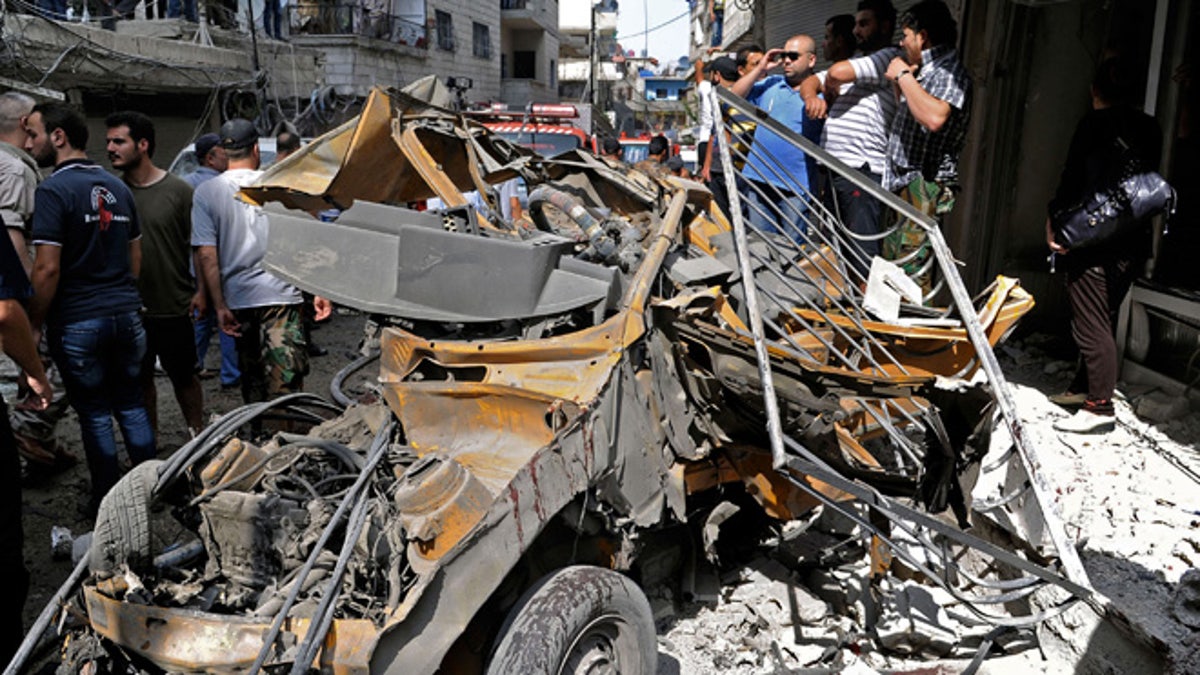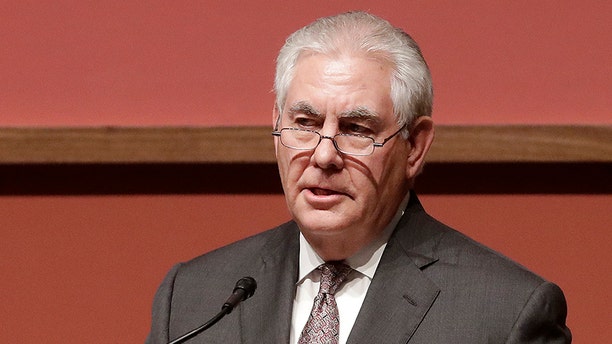
June 23, 2013: In this photo released by the Syrian official news agency SANA, Syrians investigate damages after two suicide bombings hit security compounds in Damascus, Syria. (AP/SANA)
President Donald Trump is freezing more than $200 million in funds for recovery efforts in war-torn Syria amid a reassessment of the role the U.S. should play in the drawn-out conflict there, The Wall Street Journal reported on Friday.
The White House ordered the State Department to put the funds on hold, the report said. According to The Journal, Trump did so after reading a news report saying that the U.S. had recently committed an additional $200 million to early recovery efforts.
Exiting Secretary of State Rex Tillerson pledged the money in February in Kuwait at a meeting of the coalition trying to defeat the Islamic State (ISIS).
The apparent shift comes as the fight against ISIS has reached an impasse, with the insurgent group controlling just 5 percent of the battered nation but holding fast to it and losing little ground in recent months.
The Journal said that a sped-up pullback of America from Syria could kick up concerns about yielding control of the combat-scarred country to Iran and Russia.
In the past month, U.S.-led airstrikes supporting local forces on the ground have diminished. In January, Tillerson laid out a strategy in which the U.S. would remain in Syria for the foreseeable future to prevent an ISIS resurgence and keep Iran's influence in check.
Now, The Journal said, Trump looks to be questioning that tack. He has said he would like to see regional allies like Saudi Arabia take on more of the burden, and the White House has asked Gulf Arab states to come up with billions of dollars for Syria's recovery.
The State Department last year spent $200 million on stabilization work in Syria, including removing unexploded weapons and restoring water, power and electricity, and an additional $225 million in funds was designated this year. The freezing of some or all of those funds, plus the additional spending promised last month, could cause existing programs to halt, U.S. officials told The Journal.
Only two months ago, Trump's aides thought they'd persuaded him that the U.S. needed to keep its presence in Syria open-ended — not only because the Islamic State group has yet to be entirely defeated, but also because the resulting power vacuum could be filled by other extremist groups or by Iran. Trump signed off on major speech in January in which Secretary of State Rex Tillerson laid out the new strategy and declared "it is vital for the United States to remain engaged in Syria."
But by mid-February, Trump was telling his top aides in meetings that as soon as victory can be declared against ISIS, he wanted American troops out of Syria, said the officials, who spoke to The Associated Press on condition of anonymity because they weren't authorized to speak publicly.
Trump's first public suggestion he was itching to pull out came in a news conference with visiting Australian Prime Minister Malcom Turnbull on Feb. 23, when Trump said the U.S. was in Syria to "get rid of ISIS and go home." On Thursday, in a domestic policy speech in Ohio, Trump went further, The AP reported.
"We'll be coming out of Syria, like, very soon. Let the other people take care of it now. Very soon — very soon, we're coming out," Trump said.
The public declaration caught U.S. national security agencies off-guard and unsure whether Trump was formally announcing a new, unexpected change in policy. The Pentagon and State Department reached out to the White House's National Security Council for clarification.
The White House's ambiguous response: Trump's words speak for themselves.
"The mission of the Department of Defense to defeat ISIS has not changed," said Maj. Adrian Rankine-Galloway, a Pentagon spokesman, according to The AP.
Still, without a clear directive from the president, planning has not started for a withdrawal from Syria, officials said, and Trump has not advocated a specific timetable.
For Trump, who campaigned on an "America First" mantra, Syria is just the latest foreign arena where his impulse has been to limit the U.S. role. Like with NATO and the United Nations, Trump has called for other governments to step up and share more of the burden so that Washington doesn't foot the bill. His administration has been crisscrossing the globe seeking financial commitments from other countries to fund reconstruction in both Syria and Iraq, but with only limited success, The AP said.
The Associated Press contributed to this report.
Editor's Note: An earlier version of this story incorrectly identified the prime minister of Australia.










































